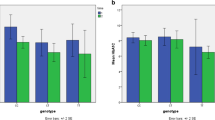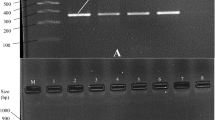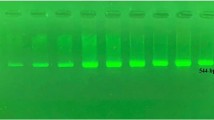Abstract
Background
Diabetes mellitus (DM) is associated with high blood glucose levels and sulfonylureas (SFUs) are one of the treatment options for DM. SFUs bind to sulfonylurea-1 receptor (SUR1), which is encoded by the ABCC8 gene and leads to blood glucose reduction. Genetic variants like rs757110 and rs1799854 of ABCC8 can influence the response to the drug’s efficiency. Therefore, this study aimed to investigate the association between the ABCC8 rs757110 and rs1799854 genetic variants and response to SFUs treatment.
Methods
Totally, 61 DM patients with SFUs treatment were included. Baseline characteristics of the patients were recorded and 5 ml of blood was taken from each patient. After DNA extraction, a sequence containing rs757110 and rs1799854 was synthesized by the PCR method, and the PCR products were used for Sanger sequencing.
Results
Frequencies of GG, GA, and AA genotypes of rs1799854 variant was 12 (40%), 14 (46.7%), and 4 (13.3%), and the frequencies of CC, AC, and AA genotypes for rs757110 variant was 3 (9.7%), 5 (16.1%) and 23 (74.2%) in, respectively. Patients with different genotypes had the same age, BMI (body mass index), initial FBS (Fasting blood sugar), initial HbA1c, treatment duration, gender and history of smoking, alcohol consumption, and exercise. There was no significant difference in FBS and HbA1c changes after SFUs treatment between patients with rs757110 variant (p = 0.39 for FBS and p = 0.76 for HbA1c) and rs1799854 (p = 0.24 for FBS and p = 0.36 for HbA1c).
Conclusion
The rs1799854 and rs757110 variants of the ABCC8 gene had no significant influence on response to SFUs treatment.


Similar content being viewed by others
Data availability
This project’s data will be open to the public.
Abbreviations
- DM:
-
diabetes mellitus
- SFUs:
-
Sulfonylureas
- SUR1:
-
sulfonylurea-1 receptor
- PCR:
-
polymerase chain reaction
- BMI:
-
body mass index
- FBS:
-
fasting blood sugar
- HbA1c:
-
Hemoglobin A1c
- T1D:
-
type 2 diabetes
- T2D:
-
type 2 diabetes
- GDM:
-
gestational diabetes
- T1DM:
-
In type 1 diabetes mellitus
- T2DM:
-
type 2 diabetes mellitus
- SD:
-
standard deviation
- EDTA:
-
ethylenediamine tetraacetic acid
References
Wu H, Yang S, Huang Z, He J, Wang X. Type 2 diabetes mellitus prediction model based on data mining. Inf Med Unlocked. 2018;10:100–7.
International Diabetes Federation. IDF Diabetes Atlas. 2021, International Diabetes Federation: Brussels, Belgium. p. 40–50.
Semiz S, Dujic T, Causevic A. Pharmacogenetics and personalized treatment of type 2 diabetes. Biochemia Med. 2013;23:154–71.
Christensen DH, Rungby J, Thomsen RW. Nationwide trends in glucose-lowering drug use, Denmark, 1999–2014. Clin Epidemiol. 2016;8:381–7.
Sola D, Rossi L, Schianca GPC, Maffioli P, Bigliocca M, Mella R, et al. Sulfonylureas and their use in clinical practice. Arch Med Sci. 2015;12:840–8.
Henquin J-C. Misunderstandings and controversies about the insulin-secreting properties of antidiabetic sulfonylureas. Biochimie. 2017;143:3–9.
Zeng Z, Huang S-Y, Sun T. Pharmacogenomic studies of current antidiabetic agents and potential new drug targets for Precision Medicine of Diabetes. Diabetes Ther. 2020;11:2521–38.
Balamurugan K, Kavitha B, Yang Z, Mohan V, Radha V, Shyng S-L. Functional characterization of activating mutations in the sulfonylurea receptor 1 (ABCC8) causing neonatal diabetes mellitus in asian indian children. Pediatr Diab. 2019;20:397–407.
Van Leeuwen N, Swen J, Guchelaar H-J, t Hart L. The role of pharmacogenetics in drug disposition and response of oral glucose-lowering drugs. Clin Pharmacokinet. 2013;52:833–54.
Ebid A-HIM, Ehab M, Ismail A, Soror S, Mahmoud MA. The influence of SLC22A1 rs622342 and ABCC8 rs757110 genetic variants on the efficacy of metformin and glimepiride combination therapy in egyptian patients with type 2 diabetes. J Drug Assess. 2019;8:115–21.
Viji D, Aswathi P, Charmine PP, Husain RA, Ameen SN, Ahmed SS, et al. Genetic association of ABCC8 rs757110 polymorphism with type 2 diabetes Mellitus risk: a case-control study in South India and a meta-analysis. Gene Rep. 2018;13:220–8.
Miller SA, Dykes D, Polesky H. A simple salting out procedure for extracting DNA from human nucleated cells. Nucleic Acids Res. 1988;16:1215.
Haghvirdizadeh P, Sadat Haerian M, Haghvirdizadeh P, Sadat Haerian B. ABCC8 genetic variants and risk of diabetes mellitus. Gene. 2014;545:198–204.
De Franco E, Saint-Martin C, Brusgaard K, Knight Johnson AE, Aguilar-Bryan L, Bowman P et al. Update of variants identified in the pancreatic β-cell KATP channel genes KCNJ11 and ABCC8 in individuals with congenital hyperinsulinism and diabetes Hum Mutat. 2020; 41:884–905.
Qin LJ, Lv Y, Huang QY. Meta-analysis of association of common variants in the KCNJ11-ABCC8 region with type 2 diabetes. Genet Mol Res. 2013;12:2990–3002.
Bakhtiyari A, Haghani K, Bakhtiyari S, Zaimy MA, Zahed N, Gheysarzadeh A, et al. Association between ABCC8 Ala1369Ser polymorphism (rs757110 T/G) and type 2 diabetes risk in an iranian population: a case-control study. Endocr Metab Immune Disord Drug Targets. 2021;21:441–7.
Bondar I, Filipenko M, Shabelnikova O, Sokolova E. PS 0459; Genetics; Association of Gene Polymorphism TCF7L2 (rs7903146), KCNJ11 (rs5219), ABCC8 (rs757110) with Type 2 Diabetesin Western Siberia. 2014; 2014: 165–5.
Lang VY, Fatehi M, Light PE, Light. Pharmacogenomic analysis of ATP-sensitive potassium channels coexpressing the common type 2 diabetes risk variants E23K and S1369A. Pharmacogenet Genom. 2012;22:206–14.
Hamming KS, Soliman D, Matemisz LC, Niazi O, Lang Y, Gloyn AL, et al. Coexpression of the type 2 diabetes susceptibility gene variants KCNJ11 E23K and ABCC8 S1369A alter the ATP and sulfonylurea sensitivities of the ATP-sensitive K + channel. Diabetes. 2009;58:2419–24.
Klen J, Dolžan V, Janež A. CYP2C9, KCNJ11 and ABCC8 polymorphisms and the response to sulphonylurea treatment in type 2 diabetes patients. Eur J Clin Pharmacol. 2014;70:421–8.
Feng Y, Mao G, Ren X, Xing H, Tang G, Li Q, et al. Ser1369Ala variant in sulfonylurea receptor gene ABCC8 is associated with antidiabetic efficacy of gliclazide in chinese type 2 diabetic patients. Diabetes Care. 2008;31:1939–44.
Karkhaneh L, Tabatabaei O, Bandarian F, Mohseni Sh, Larijani B. Pharmacogenomics of sulfonylureas in type 2 diabetes mellitus; a systematic review. J Diabetes Metab Disord. 2021;2:863–79.
Nikolac N, Simundic A-M, Katalinic D, Topic E, Cipak A, Rotkvic VZ. Metabolic control in type 2 diabetes is associated with sulfonylurea receptor-1 (SUR-1) but not with KCNJ11 polymorphisms. Arch Med Res. 2009;40:387–92.
Engwa GA, Nwalo FN, Chikezie CC, Onyia CO, Ojo OO, Mbacham WF, et al. Possible association between ABCC8 C49620T polymorphism and type 2 diabetes in a nigerian population. BMC Med Genet. 2018;19:1–7.
He Yy, Zhang R, Shao Xy, Hu C, Wang C, Jx Lu, et al. Association of KCNJ11 and ABCC8 genetic polymorphisms with response to repaglinide in chinese diabetic patients 1. Acta Pharmacol Sin. 2008;29:983–9.
Nikolac N, Simundic AM, Saracevic A, Katalinic D. ABCC8 polymorphisms are associated with triglyceride concentration in type 2 diabetics on sulfonylurea therapy. Genet Test Mol Biomarkers. 2012;16:924–30.
Zychma MJ, Gumprecht J, Strojek K, Grzeszczak W, Moczulski D, Trautsolt W, et al. Sulfonylurea receptor gene 16 – 3 polymorphism–association with sulfonylurea or insulin treatment in type 2 diabetic subjects. Med Sci Monit. 2002;8:CR512–5.
Acknowledgements
The authors thank to T2DM patients who participated in this study.
Funding
No funding was obtained.
Author information
Authors and Affiliations
Contributions
MA and MP drafted the manuscript and performed lab genotyping; SGH provided clinical guidance to the research; FSH performed the statistical analysis; FB managed the project; MH provided genetic guidance to the research. All authors contributed to and approved the final version of the manuscript.
Corresponding authors
Ethics declarations
Competing of interest
There are no conflicts of interest declared by the authors.
Consent for publication
The present study research is approved by the ethics committee of Islamic Azad University and all T2DM patients signed written consent forms.
Additional information
Publisher’s note
Springer Nature remains neutral with regard to jurisdictional claims in published maps and institutional affiliations.
Melika Azimi and Melika Paseban both authors contribute the first authorship.
Rights and permissions
Springer Nature or its licensor (e.g. a society or other partner) holds exclusive rights to this article under a publishing agreement with the author(s) or other rightsholder(s); author self-archiving of the accepted manuscript version of this article is solely governed by the terms of such publishing agreement and applicable law.
About this article
Cite this article
Azimi, M., Paseban, M., Ghareh, S. et al. Association of ABCC8 gene variants with response to sulfonylurea in type 2 diabetes mellitus. J Diabetes Metab Disord 22, 649–655 (2023). https://doi.org/10.1007/s40200-023-01189-2
Received:
Revised:
Accepted:
Published:
Issue Date:
DOI: https://doi.org/10.1007/s40200-023-01189-2




